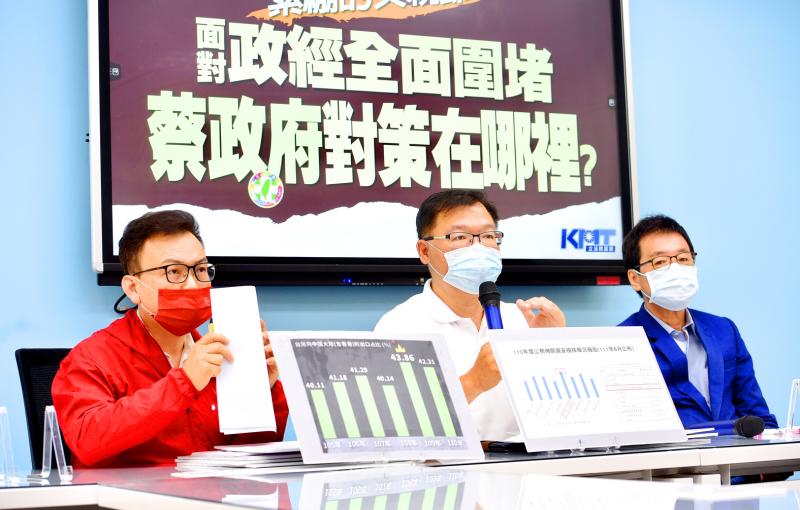Chinese Nationalist Party (KMT) lawmakers yesterday accused the Democratic Progressive Party (DPP) administration of wasting its massive cybersecurity budget, after Web domains battled a record number of cyberattacks in response to a visit by US House of Representatives Speaker Nancy Pelosi last week.
Internet traffic on Tuesday last week peaked at 23 times the previous single-day record and remained high throughout the week, as government Web sites and other online systems came under attack.
Hacker organization APT 27, believed to be a Chinese state-sponsored group, on Wednesday claimed responsibility, although Beijing has refused to comment on the issue.

Photo: Lo Pei-de, Taipei Times
The past week has exposed the severity of the risk posed by cyberattacks, KMT Legislator Lee De-wei (李德維) told a news conference at the legislature in Taipei.
Web domains received a maximum score of 100 in a June report on government cybersecurity, yet the Ministry of Foreign Affairs Web site — which was included in the report — was forced down multiple times last week, he said.
The government set an annual budget of nearly NT$450 million (US$15 million) for cybersecurity last year, but the second it faced an attack, “it was like throwing all that money away,” Lee said, adding that even the Web site for the new Ministry of Digital Affairs was outsourced.

Photo: Yang Mien-chieh, Taipei Times
“Can the public really trust this kind of cybersecurity?” he asked.
As for China’s economic sanctions, KMT Legislator Cheng Cheng-chien (鄭正鈐) accused the government of forcing businesses to face the burden on their own, as Taiwanese firms rely on cross-strait trade.
The share of Taiwan’s exports destined for China has steadily increased to 42.31 percent last year, with the trade surplus likely totaling US$80 billion in the first half of this year alone, he said.
Yet Beijing is now becoming stricter, most recently forcing exporters to display “Taiwan, China” or “Chinese Taipei” on their products, he said.
The DPP has been reaping the benefits of the Economic Cooperation Framework Agreement enacted under the KMT’s time in power, Lee said, referring to a cross-strait free-trade deal signed in 2010.
If a cross-strait trade war breaks out, the DPP administration must respond instead of shifting the burden onto the public, he added.
The actions of the Chinese Communist Party must be condemned as unbefitting China and Chinese culture, KMT Legislator Alex Fai (費鴻泰) said.
Beijing’s military exercises would only drive the two sides further apart, making the DPP’s anti-China rhetoric more palatable, he added.
Although they reached a record high earlier in the week, cyberattacks continued into the weekend.
The live broadcast on Formosa Television News’ Web site was briefly taken over on Saturday evening by messages in simplified characters declaring China’s sovereignty over Taiwan, with the patriotic song My People, My Country (我和我的祖國) playing in the background.
The feed returned to normal after two minutes.
On Sunday, the Web pages for National Taiwan University’s Office of Academic Affairs and Office of Research and Development were changed to display the message: “The world only has one China” in simplified characters.
The university said the pages have been taken down as it works to fix the issue.
They were still inaccessible as of last night.
Additional reporting by Lin Nan-ku and Yang Mien-chieh

A preclearance service to facilitate entry for people traveling to select airports in Japan would be available from Thursday next week to Feb. 25 at Taiwan Taoyuan International Airport, Taoyuan International Airport Corp (TIAC) said on Tuesday. The service was first made available to Taiwanese travelers throughout the winter vacation of 2024 and during the Lunar New Year holiday. In addition to flights to the Japanese cities of Hakodate, Asahikawa, Akita, Sendai, Niigata, Okayama, Takamatsu, Kumamoto and Kagoshima, the service would be available to travelers to Kobe and Oita. The service can be accessed by passengers of 15 flight routes operated by

MORE FALL: An investigation into one of Xi’s key cronies, part of a broader ‘anti-corruption’ drive, indicates that he might have a deep distrust in the military, an expert said China’s latest military purge underscores systemic risks in its shift from collective leadership to sole rule under Chinese President Xi Jinping (習近平), and could disrupt its chain of command and military capabilities, a national security official said yesterday. If decisionmaking within the Chinese Communist Party has become “irrational” under one-man rule, the Taiwan Strait and the regional situation must be approached with extreme caution, given unforeseen risks, they added. The anonymous official made the remarks as China’s Central Military Commission Vice Chairman Zhang Youxia (張又俠) and Joint Staff Department Chief of Staff Liu Zhenli (劉振立) were reportedly being investigated for suspected “serious

ENHANCING EFFICIENCY: The apron can accommodate 16 airplanes overnight at Taoyuan airport while work on the third runway continues, the transport minister said A new temporary overnight parking apron at Taiwan Taoyuan International Airport is to start operating on Friday next week to boost operational efficiency while the third runway is being constructed, the Ministry of Transportation and Communications said yesterday. The apron — one of the crucial projects in the construction of the third runway — can accommodate 16 aircraft overnight at the nation’s largest international airport, Minister of Transportation and Communications Chen Shih-kai (陳世凱) told reporters while inspecting the new facility yesterday morning. Aside from providing the airport operator with greater flexibility in aircraft parking during the third runway construction,

Taiwanese and US defense groups are collaborating to introduce deployable, semi-autonomous manufacturing systems for drones and components in a boost to the nation’s supply chain resilience. Taiwan’s G-Tech Optroelectronics Corp subsidiary GTOC and the US’ Aerkomm Inc on Friday announced an agreement with fellow US-based Firestorm Lab to adopt the latter’s xCell, a technology featuring 3D printers fitted in 6.1m container units. The systems enable aerial platforms and parts to be produced in high volumes from dispersed nodes capable of rapid redeployment, to minimize the risk of enemy strikes and to meet field requirements, they said. Firestorm chief technology officer Ian Muceus said